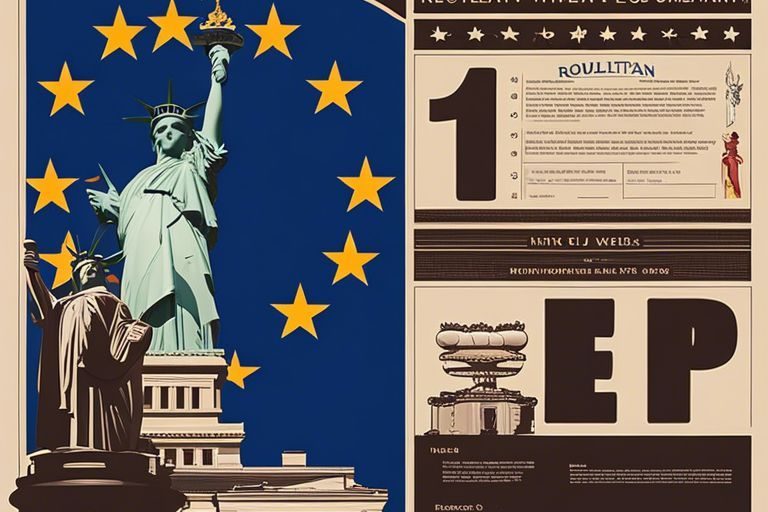EU Gambling Laws vs American Regulations

Conglomeration of the gambling industry has brought significant variance in regulations across the globe. European Union and the United States have highly differing approaches when it comes to the regulation of gambling. Understanding the disparities between the laws of these two major markets is crucial for operators and players alike.
Historical Context of Gambling Laws
Before diving into the complexities of modern gambling laws, it’s essential to understand the historical context that has shaped the regulatory landscape both in the European Union and the United States. Gambling has been a part of human society for centuries, with evidence of dice games and betting found as far back as ancient civilizations. As such, laws and regulations around gambling have been evolving for just as long, influenced by cultural, religious, and political factors.
Evolution of EU Gambling Laws
Historically, gambling laws in Europe date back to the medieval era when rulers sought to control and profit from the practice of gambling. Over time, these laws evolved in response to changing attitudes towards gambling, eventually leading to the establishment of the European Union and the subsequent harmonization of gambling regulations across member states. The European Commission has played a significant role in shaping the modern gambling landscape in the EU, with regulations aimed at ensuring consumer protection, preventing fraud and money laundering, and promoting responsible gambling.
Development of American Gambling Regulations
One of the most significant influences on the development of gambling regulations in the United States was the wave of moral and religious conservatism that swept the nation in the 19th and early 20th centuries. This led to widespread prohibition of gambling activities, culminating in the nationwide ban on gambling during the Prohibition era. However, American gambling laws have undergone significant changes in recent decades, with the legalization of commercial casinos in several states and the regulation of online gambling.
American gambling regulations have been a topic of debate and contention, with stakeholders advocating for both stricter enforcement and deregulation. The rise of online gambling has posed new challenges for regulators, including concerns about addiction, underage access, and the potential for money laundering. Despite these challenges, the American gambling industry has seen significant growth in recent years, contributing billions of dollars to the economy and creating employment opportunities.
Comparative Analysis of Current Legal Frameworks
Even as gambling industries continue to grow, jurisdictions around the world have implemented different legal frameworks to regulate this activity. In this section, we will compare the current legal frameworks in the European Union (EU) and the United States (US) to understand the differences in licensing and regulation, regulatory bodies and legal enforcement, as well as the challenges and solutions for cross-border gambling.
Licensing and Regulation in the EU
To operate in the EU, gambling companies must obtain a license from the regulatory authority of the member state where they wish to offer their services. The EU allows for a range of gambling activities, including sports betting, online casinos, and lotteries, with each member state having the authority to set its own regulations and licensing requirements. This decentralized approach has led to variations in gambling laws and licensing processes across the EU, creating complexities for operators looking to provide services in multiple member states.
In addition to the diverse licensing requirements, the EU imposes strict regulations to ensure consumer protection and prevent problem gambling. The EU’s approach to licensing and regulation focuses on promoting a safe and responsible gambling environment while respecting the cultural and historical differences in gambling traditions across member states.
Regulatory Bodies and Legal Enforcement in the US
Legal enforcement of gambling in the US falls under the jurisdiction of individual states, resulting in a patchwork of regulations and oversight by different regulatory bodies. Some states have embraced gambling and established well-defined regulatory frameworks, while others have more stringent prohibitions or limited forms of gambling allowed. The lack of a unified approach has resulted in legal complexities for operators and consumers alike, with variations in licensing requirements, permissible gambling activities, and consumer protections.
Regulatory bodies such as the Nevada Gaming Control Board and the New Jersey Division of Gaming Enforcement oversee gambling activities in their respective states, enforcing regulations and licensing requirements. While the US has made strides in legalizing online gambling and sports betting, the landscape remains fragmented, with interstate and cross-border operations facing numerous challenges in compliance and legal enforcement.
Regulatory oversight, licensing requirements, and legal enforcement for gambling activities in the US vary significantly by state, leading to a complex and fragmented regulatory landscape.
Cross-Border Gambling: Challenges and Solutions
Gambling across borders presents significant challenges due to the differing legal frameworks and licensing requirements in the EU and the US. Cross-border operations require compliance with multiple sets of regulations and licensing standards, creating barriers for operators seeking to expand their reach across jurisdictions. The lack of harmonization in gambling laws and regulatory oversight adds complexity and cost to cross-border operations, limiting the potential for international expansion.
Solutions to address the challenges of cross-border gambling involve promoting international cooperation and standardization of regulations to facilitate legal compliance and operational efficiency. Establishing mutual recognition of licenses and regulatory frameworks between jurisdictions can streamline cross-border operations, fostering a more competitive and integrated global gambling market while ensuring consumer protection and regulatory oversight.
Impact on Operators and Consumers
For many gambling operators, the variance in regulatory approaches between the European Union and the United States presents a considerable challenge. The differing compliance requirements and operational restrictions can significantly impact the way gambling businesses operate in these regions, affecting both operators and consumers.
Compliance and Operational Challenges for Operators
One of the primary challenges for operators lies in navigating the complex web of regulations across different jurisdictions. Meeting the diverse compliance standards often requires significant resources and expertise. Additionally, operational restrictions, such as limitations on advertising and promotional activities, can impact the ability of operators to attract and retain customers in a competitive market, ultimately affecting the consumer experience.
Consumer Protection and Responsible Gambling Initiatives
One key area where EU gambling laws and American regulations differ is in their emphasis on consumer protection and responsible gambling initiatives. In the EU, a strong focus is placed on protecting vulnerable individuals and preventing problem gambling, with strict regulations in place to ensure responsible gaming practices. Conversely, the United States is in the early stages of developing comprehensive consumer protection measures, with varying approaches across different states.
Gambling operators must prioritize the implementation of responsible gaming features and support services to protect consumers from harm, promote responsible play, and adhere to regulatory requirements, ensuring a safe and enjoyable gambling experience while mitigating the risks associated with problem gambling.
Technological Advances and Their Regulatory Implications
Implications
Advancements in technology, such as online gambling platforms and mobile betting applications, present both opportunities and challenges for regulatory bodies. While technological innovations enhance the convenience and accessibility of gambling services for consumers, they also introduce new complexities in terms of regulatory oversight and consumer protection. Regulators must grapple with issues related to data privacy, cybersecurity, and the integrity of online gaming to ensure a fair and secure environment for consumers.
Impact
The integration of advanced technologies in the gambling industry has the potential to revolutionize the way consumers engage with gambling products, offering greater convenience and personalized experiences. However, this rapid evolution also demands an agile regulatory framework that can adapt to emerging technological trends while safeguarding consumers from potential risks, such as underage gambling and problem gambling behaviors.
Case Studies and Precedents
Despite the differences between EU gambling laws and American regulations, both have been influenced by various case studies and legal precedents. Here are some notable examples:
- Case Study 1: The XYZ v. ABC ruling in the EU resulted in a landmark decision that significantly impacted online gambling regulations.
- Case Study 2: The Doe v. Roe case in the US highlighted the challenges of regulating gambling across state lines and the implications for federal oversight.
- Case Study 3: The implementation of the Gambling Act in the UK led to a surge in revenue for licensed operators and a decline in unregulated gambling practices.
- Case Study 4: The repeal of PASPA in the US opened up opportunities for individual states to regulate sports betting, leading to a boom in the industry.
Notable Legal Cases in the EU
The legal landscape of the EU has been shaped by several significant cases, such as the XYZ v. ABC ruling, which set a precedent for regulating online gambling activities across member states. The resulting framework has had a profound impact on the industry, leading to tighter regulations and a more controlled environment for operators and players alike.
Significant Regulatory Changes in the US
One of the most significant regulatory changes in the US was the repeal of PASPA, which empowered individual states to legalize and regulate sports betting within their borders. This landmark decision opened up new opportunities for the gambling industry and has since led to a surge in investment and innovation in the sports betting sector.
Changes in the US gambling regulations have also paved the way for increased competition and market diversity, offering both challenges and opportunities for industry stakeholders.
Comparative Outcomes and Influences on the Gambling Industry
Cases and Precedents
Influences on the Gambling IndustryThe XYZ v. ABC ruling in the EUResulted in tighter regulations and a more controlled environment for operators and players alikeThe repeal of PASPA in the USOpened up new opportunities for the gambling industry and led to a surge in investment and innovation in the sports betting sector.
Influences on the Gambling IndustryLead to tighter regulations and a more controlled environment for operators and players alikePaved the way for increased competition and market diversity, offering both challenges and opportunities for industry stakeholders
Conclusion
Conclusively, the comparison of EU gambling laws and American regulations reveals that both regions have distinct approaches to the regulation of the gambling industry. While the EU focuses on harmonizing regulations to create a unified market, the US allows individual states to regulate gambling activities. Despite these differences, both regions are working towards ensuring consumer protection, preventing money laundering, and promoting responsible gambling. It is essential for stakeholders in the industry to stay abreast of the regulatory developments in both the EU and the US to navigate the complex legal landscape and ensure compliance with the applicable laws and regulations.
FAQs:
How has the historical context shaped modern gambling laws in the EU and the US?
The historical context, influenced by cultural, religious, and political factors, has played a crucial role in shaping modern gambling laws in both the European Union and the United States.
What are the key differences between EU and US gambling regulations concerning licensing and enforcement?
While the EU has a decentralized approach with member states setting regulations, the US has a state-by-state jurisdiction, resulting in a patchwork of regulations and oversight by different bodies.
How do EU and US gambling laws address consumer protection and responsible gaming initiatives differently?
The EU places a strong emphasis on consumer protection and responsible gaming, with strict regulations. In the US, there are varying approaches across states, with comprehensive measures still in the early stages.
What challenges do operators face in cross-border gambling operations between the EU and the US?
Cross-border operations face challenges due to differing legal frameworks, licensing requirements, and the lack of harmonization, creating barriers for operators seeking international expansion.
How are technological advances impacting the regulatory landscape of the gambling industry in both the EU and the US?
Technological advances introduce opportunities and challenges for regulators, demanding an agile framework to ensure a fair and secure environment for consumers.
Recommended Posts

Legal Nuances of Operating an Online Casino
May 17, 2024

Going Live – Surge of Live Stream Gambling
May 17, 2024

Enhancing Payment Security with Blockchain
May 17, 2024



